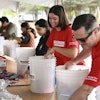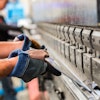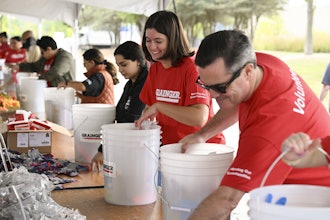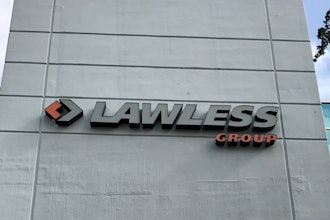This article first appeared in the November/December print issue of Industrial Distribution. To view the full digital edition, click here.
When the management team of WELD Specialty Gas & Equipment made the decision to get involved in the industrial gas supply business in 2003, it had growth on its mind. Before that, WELD was strictly a welding hardgoods supplier since 1996, operating out of a single location on the north end of Milwaukee, WI. But ever since WELD’s finances were in place to start selling industrial gases, the company has become bigger and better.
“We had the expectation that we were going to grow this thing, and grow it well,” says John Dunfee, president of WELD and one of three owners who bought the company in 1996. “Did we think we’d quadruple in size? Not necessarily.”
Free Whitepaper: How the convergence of service and technology is creating a new breed of consumer
In 2002, WELD staffed 18 employees. Today, it’s Wisconsin’s largest independent welding distributor. The company projects 2015 sales four times that of 2002’s, and its full-time headcount is now at 62. That’s besides the addition of three branch locations. Expanding with facilities in Kaukauna (2003), Fond du Lac (2009), and Waukesha (March, 2015) has given WELD a formidable presence across eastern Wisconsin. Five cylinder exchange locations further allow it to serve the region’s top population centers – Milwaukee, Green Bay/Appleton, Oshkosh, and Fond du Lac – in speedy fashion.
Why Choose WELD?
In a market that includes several large wholesale industrial gas suppliers, WELD says its people and service capabilities are its best resources.
“Most of our sales force is very experienced,” says Steve Betthauser, WELD Sales Manager. “A lot of our competitors will take a guy like me and have him work over the top of 10 other people who aren’t experienced. Here, pretty much all our salespeople are tenured and can go in and solve any customer’s problem. A couple of us together can noodle things out that most our competition can’t do.”
As of early October, WELD staffs nine inside salespeople and 10 outside salespeople. The average WELD employee age is 45 years old, with most of them steeped in technical welding knowledge. So when a customer calls with a product question, it can be answered in that same call.
Nowadays, the customer experience is everything in distribution sales. To that end, WELD will do things that cost the company money up front, knowing customer loyalty will pay off in the long run.
“We’ll have customers calling in an order at 5 p.m. and we’ll have it on the truck the next day,” Dunfee says. “That would be very unusual for one of the big guys to do. If we can get it there tonight, we’ll get it there tonight, otherwise they’ll see it tomorrow. We’ll make runs that lose money, and that decision can’t be made in a big place. We take care of them, and good customers remember that.”
Along with a wealth of experience and customer-oriented culture, it’s in services that WELD sets itself apart from the competition. One of the top services the company offers is cylinder tracking. Lost cylinders is a major problem in the industrial gases business, and can cause friction between customers and suppliers. WELD doesn’t have those issues because it began tracking cylinders starting with the very fi rst one it bought in 2003. Since then, every cylinder WELD owns is barcoded, audited, and tracked.
“None of the big guys track their cylinders. They can’t,” Dunfee says. “They’ve owned their cylinders forever, so those cylinders have been out with customers, and through the course of making acquisitions, those cylinders are wherever. We had the advantage of starting this when tracking was much more doable.”
WELD customers can get a cylinder tracking report online. It details the cylinder barcode and serial number, the date it was dropped off, and how many days it’s been there. That report enables customers to save money on rent. A customer can view it, see they’ve had a WELD cylinder sitting idle for x amount of days, and have it returned so they can stop paying rent on it.
“We (WELD salespeople) all came from competitors, where cylinder balance issues were always a huge problem,” Betthauser says. “This tracking system makes it a lot easier. It’s something we can sell when we go in with a new customer. It’s something that most of our competitors don’t do, if any.”
Another service WELD takes great pride in is its topnotch vendor managed inventory, powered by AutoCrib. WELD has provided VMI services for 15 years, continuously advancing the offering to match customer demands. When the management team reexamined the way the market was moving and recognized the demand for point-of-use tracking, it chose AutoCrib as its VMI supplier.
“Since working with them, we’ve had great success,” says Milwaukee store manager Kamal Musa. “It’s allowed us to compete with the larger national organizations.”
Not only does WELD distribute VMI to help customers, but it uses the service as a training tool within the company itself.
“We look at our VMI personnel who are out with the customer as someone who learns the product, learns what the customer is doing, and is an advocate for them,” Musa says. “They’re not just a delivery guy.”
Along with offering custom piping systems and cost management solutions, two other cornerstones for WELD are its repair service and certifi ed welding inspectors (CWI). WELD has grown its repair department in recent years to where it now has three full-time technicians in Milwaukee and one in Kaukauna, along with a part-timer at each. WELD also has a CWI in each location, and the company uses that asset to provide onsite welding certifications.
E-commerce on the Way
As WELD has grown its business over the years, it’s recognized the need to adapt to a digital world. With that, the company recently reevaluated and redesigned its website. The first thing WELD wants to accomplish is to provide an information-based website – a hub where people can see what’s going on in the industry, at WELD, welding associations, and activities in the market.
“We want to be a knowledge center for people,” Musa says. “We keep them in-the-know so they keep coming back to us.”
The next phase of WELD’s digital overhaul is e-commerce. As of mid-October, the website doesn’t offer online sales, but that is in the works. Management is currently evaluating customer needs and how the company should do B2B sales.
“We want to provide that service for our customers,” Musa says. “We need to adapt to do that. We want to have customers log on, order what they need, get a confirmation, and feel comfortable that it’s handled. We don’t want to slap something together that doesn’t meet their needs. We have the talent internally so that the backbone and structure will come along nicely.”
Expansion
In terms of physical expansion, it’s been an eventful past six years for the company. Since 2009, it added its 10,000 square foot Fond du Lac Location, and expanded its Milwaukee headquarters with a new warehouse and renovated distribution center. Those upgrades and further industrial gas sales success led to the acquisition of Waukesha-based Repair Alloy, which later opened as WELD’s fourth location in March. A grand-opening for Waukesha is in the works as of mid-October.
Along the way, WELD received ALM Material Handling’s 2013 President’s Award as its Top Distributor of the Year.
Dunfee said the company weathered the 2008-2009 recession better than most in the industry, taking only a 12 percent sales dip. WELD was able to avoid any layoffs in that period while continuing to add new accounts.
“We made up for that hard landing with grabbing market share,” Dunfee says. Even during the economic downturn, WELD stayed aggressive and underwent the aforementioned 2009 expansion.
More recently, as low oil prices have significantly negatively impacted large industrial distributors’ bottom lines, it’s had a lesser effect on independent welding distributors. Dunfee says there’s been some impact because of peripheral customers who sell to oil and gas, but WELD is still projecting solid year-over-year growth for 2015.
Another challenge that goes with expansion is logistics. WELD has increased its logistical efficiencies as of late, an effort headed by the addition of full-timer Kevin Taylor. Musa says Taylor has made extensive headway on reducing WELD’s carrying costs and analyzing customer usage. The company has reduced inventory of certain products so that instead of stocking 10 items for three months, it carries a couple weeks’ worth of supply and continuously turns it over. The new Waukesha facility enables WELD to stock product there and allows customers to swap cylinders.
Find the Right People
While essentially quadrupling in size from 2002 to now, going from 18 full-time employees in 2002 to WELD’s current count of 62 required a lot of smart hiring decisions. It’s something Dunfee and WELD’s management have excelled with, but note that it is a continued challenge.
“We seem to be behind the 8-ball on adding employees on a timely basis,” Dunfee says. “It’s hard to get good, experienced people in this business that meet our standard. We’ve got to work really hard to find good people and grow young talent. Most of our top sales guys are around my age, in their early 50s. They’ve been around forever and know the business very well. It’s our job to have a vision to put younger people into this business. That’s job No. 1 for us, and it’s continuous.”























